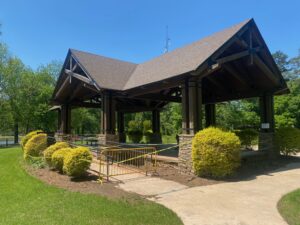With a $1.2 million shortfall projected for the 2010-2011 fiscal year starting
in October, Peachtree City Councilman Eric Imker has suggested a range of actions the city could take to make up the difference and then some.
Imker’s ideas, presented at the City Council retreat Saturday, included:
• A five-day furlough for all city employees, saving a projected $350,000.
• Reducing city staff by another three full-time employees ($210,000).
• Eliminating one of the city’s two retirement plans: a 401K investment account and a defined benefit pension plan ($180,000).
• Cutting salaries for the highest-earning city employees (in the top 10 percent), with a potential savings of $110,000.
The suggestions drew criticism from Fire Chief Ed Eiswerth, who noted that $850,000 of Imker’s ideas were personnel costs. The chief characterized the cuts as “balancing the budget on the employees’ backs.”
“My point is the entire country is letting people go and asking for pay cuts, and I understand it is very sensitive,” Imker responded, adding that the model does include future pay raises for city employees in subsequent years.
“I understand in the business world, when business is down you have to get rid of employees and I understand that, unfortunately you have to let go,” Eiswerth said. “But our business isn’t going to decrease. … There’s gonna still be as many more calls for help if not more than there is today. So continuing to look at the employees to pay the balance of the budget … we’re asking $26.90 [tax increase] a year for a $250,000 house. That’s nothing.”
Eiswerth noted that last year when employees had to pay increased insurance premiums and received no raises, they were told the city would implement a small property tax increase. That increase was not approved by council, he added.
Imker said the city needs to “consider the tough decisions.”
Eiswerth said the city’s tax rate is still quite low and that a recent survey showed significant citizen satisfaction in their interactions with city employees.
Eiswerth also noted that citizens on surveys this year and last indicated their preference to raise property taxes instead of cutting services.
Councilwoman Kim Learnard said a property tax increase would be considered this year.
Imker said he appreciated Eiswerth’s input. They both agreed the city had taken financial missteps in the past for not raising taxes when significant expenditures were made.
Eiswerth said when the city’s library was expanded and when the city bought five acres off Ga. Highway 54 West at the entrance to the Wynnmeade subdivision, the city didn’t raise property taxes commensurately.
“My frustration is with the last several city councils, absolutely not with the city’s employees, especially in the budget department,” Imker said.
Mayor Don Haddix said the employees took a big hit in benefits and pay last year, while “the citizens were asked to do nothing.”
“Now what the employees are hearing, you’re saying, once again: ‘Employees, you can pay for it all. Citizens, we expect nothing from you,’” Haddix said. “So in other words it’s a constant hit on employees … many of them are city residents. So the question is why is everything being directed to cut on city employees and why are the citizens on average of $26 a year, being removed from the formula?”
Imker replied that citizens all over the country are “getting fired, let go and taking pay cuts. Government cannot be immune from that.”
“But they’re not. They got hit last year,” Haddix retorted, asking Imker why citizens should not be faced with a property tax increase.
Haddix said he didn’t support the furlough days in particular but he could support some of Imker’s suggestions, including changes to the city’s hotel motel tax funding. Some of the other ideas merited further research, the mayor added.
City resident Steve Thaxton said he did not want a tax increase and said he felt a substantial part of the community thought the same.
Thaxton said he asked his employees to choose between a reduction in force and salary cuts, and they chose the latter. He said the city should manage its funds better and avoid a tax increase.
Imker agreed with Thaxton and suggested that city employees who didn’t like furloughs and pay cuts were welcome “to find another job.”
“If you can find a better job, go for it,” Imker said. “There’s 30 other people that will take your job. I’m sorry. I had to say it.”
Councilman Doug Sturbaum then interjected, telling Imker: “I draw the line there. That’s enough.”
“The last thing we want to do is challenge somebody else to find another job,” Sturbaum said. “And I take umbrage with that remark.”
Sturbaum then instantly moved to adjourn the meeting, which passed on a 4-1 vote with Imker voting against.
Prior to Imker’s presentation, city Finance Director Paul Salvatore pointed out that the city has scaled back its budget from $31 million to $26 million over the past two years.
“We have actively been managing the budget downward throughout the two years of the economic downturn,” Salvatore said.
Imker pointed out that the city for the next two years is relying on leftover SPLOST funds to pay for street and cart path maintenance for the next two years. After that, he said, the city will have a major problem coming up with the $1.5 million annual cost for the maintenance, Imker said.










Leave a Comment
You must be logged in to post a comment.